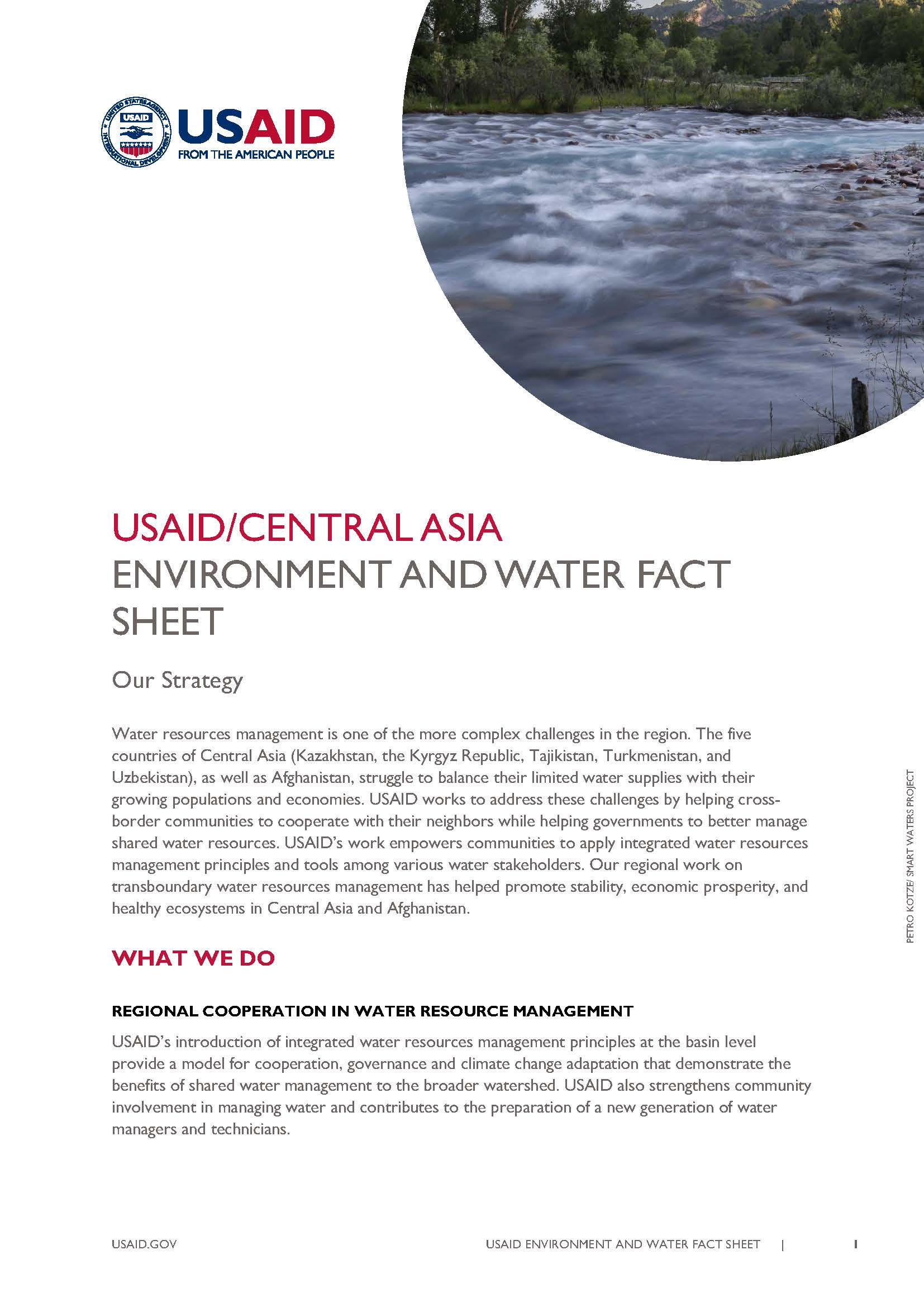Speeches Shim
USAID/Central Asia Environment and Water Fact Sheet ![]() (pdf - 460k)
(pdf - 460k)
Water resources management is one of the more complex challenges in the region. The five countries of Central Asia (Kazakhstan, the Kyrgyz Republic, Tajikistan, Turkmenistan, and Uzbekistan), as well as Afghanistan, struggle to balance their limited water supplies with their growing populations and economies. USAID works to address these challenges by helping cross-border communities to cooperate with their neighbors while helping governments to better manage shared water resources. USAID’s work empowers communities to apply integrated water resources management principles and tools among various water stakeholders. Our regional work on transboundary water resources management has helped promote stability, economic prosperity, and healthy ecosystems in Central Asia and Afghanistan.
What We Do
REGIONAL COOPERATION IN WATER RESOURCE MANAGEMENT
USAID’s introduction of integrated water resources management principles at the basin level provide a model for cooperation, governance and climate change adaptation that demonstrate the benefits of shared water management to the broader watershed. USAID also strengthens community involvement in managing water and contributes to the preparation of a new generation of water managers and technicians.
Activities
- USAID’s Smart Waters Project seeks to build a cadre of professionals in Central Asia and Afghanistan who are capable of managing shared water resources to maximize the economic value of water equitably over the long term in the face of climate change and other pressures, understand the value of such practices, and trust each other. It bridges policy level water discussions with practical on the ground implementation of those discussions. Smart Waters strengthens the technical capacity of water managers, students, researchers, policy makers and end users at the regional, national and local level in Central Asia and Afghanistan.
- USAID’s Partnership for Enhance Engagement in Research (PEER) funds research partnerships of scientists and engineers to address current and emerging water related challenges. PEER has built a regional community of researchers in Afghanistan, Pakistan and Central Asia who studied transboundary water issues, including climate change, resource management, hydrology, and policy/treaty implications.
Achievements
- 36 Smart Waters funded students representing Central Asia and Afghanistan have either graduated or are set to graduate from a two-year Master’s program on Integrated Water Resources Management at Kazakh-German University (DKU);
- 33 Master students from both Tashkent Institute of Irrigation and Agricultural Mechanization Engineers (TIIAME) and DKU participated in two Summer Schools organized by Smart Waters in Tashkent to enhance their practical knowledge of water resources engineering;
- Smart Waters helped establish 13 Small Basin Councils (SBCs) at 8 small transboundary watersheds in 5 Central Asian countries and Afghanistan. Those SBCs have facilitated over 16 joint meetings of transboundary councils to seek solutions to priority issues of common interest in their basins;
- Over 2,800 participants from the region have increased their knowledge in water resources management, water diplomacy, water saving technologies and international water law in more than 100 capacity building events organized by Smart Waters. Of specific mention are seven events organized in Turkmenistan in a webinar format which is completely new to the country. This format enhanced communication and networking between academics from Central Asia and Afghanistan with Turkmenistan;
- 39 young researchers from the region have received grants through Smart Waters to support their field studies on a range of water resources management issues;
- 14 water stakeholders from Afghanistan representing government and non-government sectors participated in the Central Asia Regional Environmental Center Program’s annual Central Asian Leadership Programs.


Comment
Make a general inquiry or suggest an improvement.